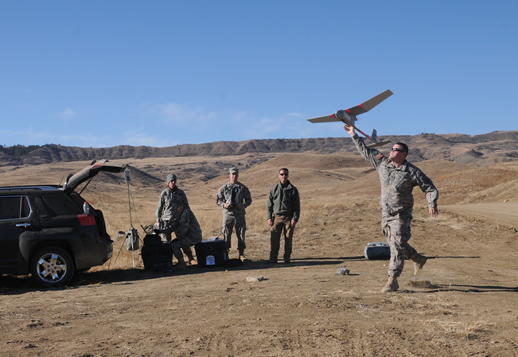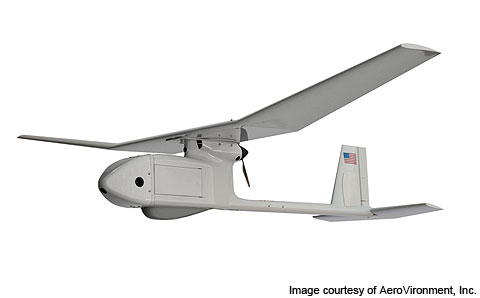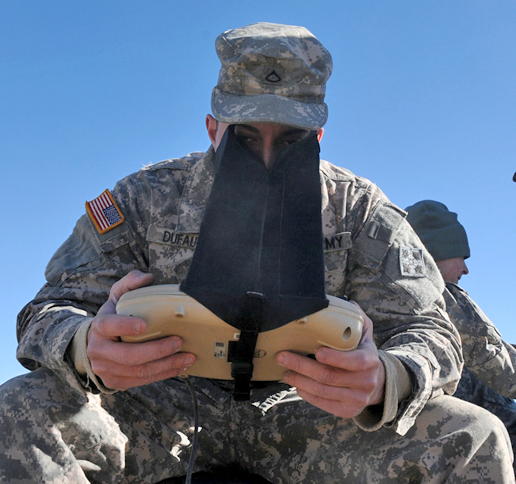![]() 1st Battalion 22nd Infantry
1st Battalion 22nd Infantry ![]()
Regulars Train on UAV's
January 2013

FORT CARSON, Colo. -
Specialist Alston Tatum, infantryman, Company B, 1st Battalion,
22nd Infantry Regiment,
1st Brigade Combat Team, 4th Infantry Division, and Second
Lieutenant Theresa Ross, intelligence officer, Headquarters
and Headquarters Company, 4th Brigade Support Battalion, 1st
Brigade Combat Team, 4th Inf. Div.,
launches a QR-11 Raven Unmanned Aerial Vehicle into the air
during a two-week training course on Fort Carson, Jan, 17, 2013.
"Raiders" enter the
wild blue
Published January 23, 2013 by Spc. Andrew Ingram
1st Brigade Combat Team Public Affairs
Close article
FORT CARSON, Colo. Unmanned aerial vehicles soared through the
sky under the control of 1st "Raider" brigade
Soldiers during QR-11 Raven training on Fort Carson, Jan. 7-18.
During the two-week training certification course, Soldiers from
1st Brigade Combat Team, 4th Infantry Division,
in a variety of career fields, learned how to launch, maneuver
and land the small, unmanned aircraft in a variety of situations
including aerial security during movement operations, terrain
reconnaissance and target acquisition during night operations.
"The benefit of this training can't be overstated,"
said 2nd Lt. Theresa Ross, intelligence officer, Headquarters and
Headquarters Company, 4th Brigade Support Battalion, 1st BCT.
"The Raven is small, lightweight, and portable.
We use it for everything from site reconnaissance to target
acquisition, so having several Soldiers trained and qualified
to operate it is a huge combat multiplier."
The hands-on approach to the training helped the Raiders get a
feel for the tactical importance of the unmanned aerial vehicle,
as well as a solid understanding of its capabilities and
limitations, said Ross.
"Not a whole lot of intelligence officers get the chance to
learn about this hardware first hand," she said.
"Because I have
first-hand knowledge of the Raven, I will have reasonable
expectations of what we can accomplish with it during a combat
deployment."
The Raven is designed for quick assembly and deployment at the
lowest levels of the military structure.
Weighing only four pounds and operated by remote control the
Raven can gather video or photographic intelligence,
or direct forces to a target using an infrared laser.
Having Soldiers from both combat arms and support career fields
participating in the training ensures that no matter
what the situation, U.S. Forces can always get an "eye in
the sky," said Steve Rocovitch,
small unmanned aerial system instructor, Rally Point Management.
"The Raven is a great asset to the military, but only if it
is used properly," Rocovitch said. "I have confidence
that these Soldiers
can take what we've practiced these past two weeks and implement
them in a complex deployed environment."
While one Soldier flew the Raven via remote control, others
viewed the UAV's flight on a laptop,
implemented flight patterns and controlled its cameras and other
tools.

The QR-11 Raven UAV
"In addition to learning how to operate the Raven, I gained
a better understanding of all the things going on
in an operating environment," said Pfc. Glen Default,
infantryman, Company B, 1st Battalion, 22nd Infantry
Regiment, 1st BCT.
"When I fly I have to be aware of everything going on in my
airspace and know what is going on groundside
to accomplish my mission. It's a much bigger picture than I have
been exposed to."
The Raider Soldiers will continue to train in preperation for an
upcoming deployment in support of U.S. Army Central Command.

FORT CARSON, Colo. -
Private First Class Glen Dufault, infantryman, Company B, 1st
Battalion, 22nd Infantry Regiment,
1st Brigade Combat Team, 4th Infantry Division, operates a QR-11
Raven Unmanned Aerial Vehicle via remote control
during a two-week training course on Fort Carson, Jan, 17, 2013.
Home | Photos | Battles & History | Current |
Rosters & Reports | Medal of Honor | Killed
in Action |
Personnel Locator | Commanders | Station
List | Campaigns |
Honors | Insignia & Memorabilia | 4-42
Artillery | Taps |
What's New | Editorial | Links |